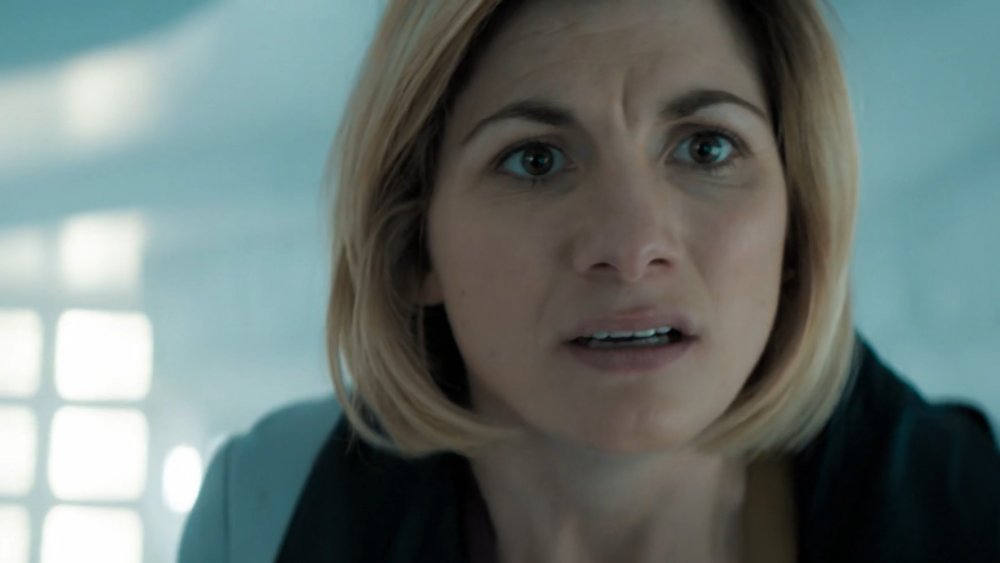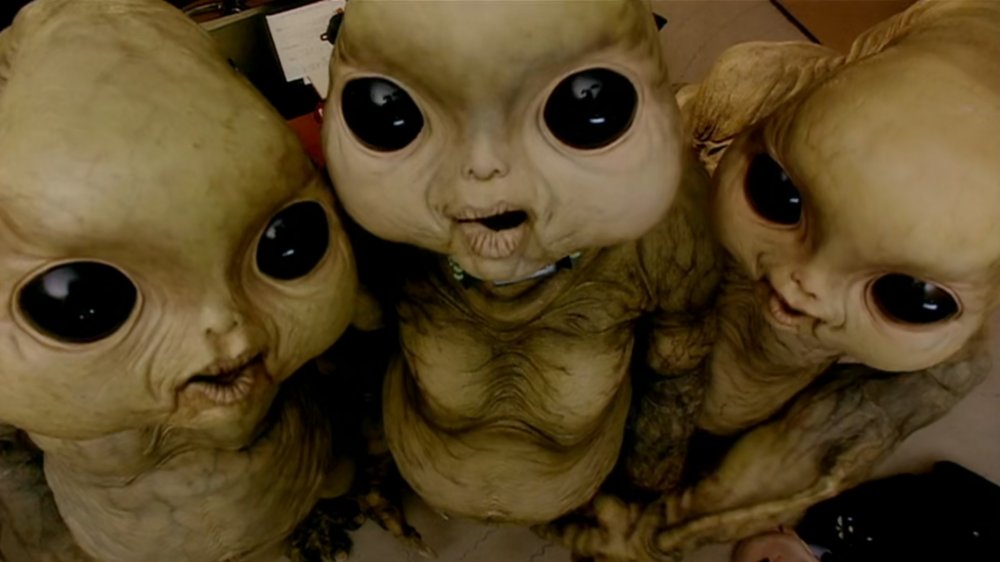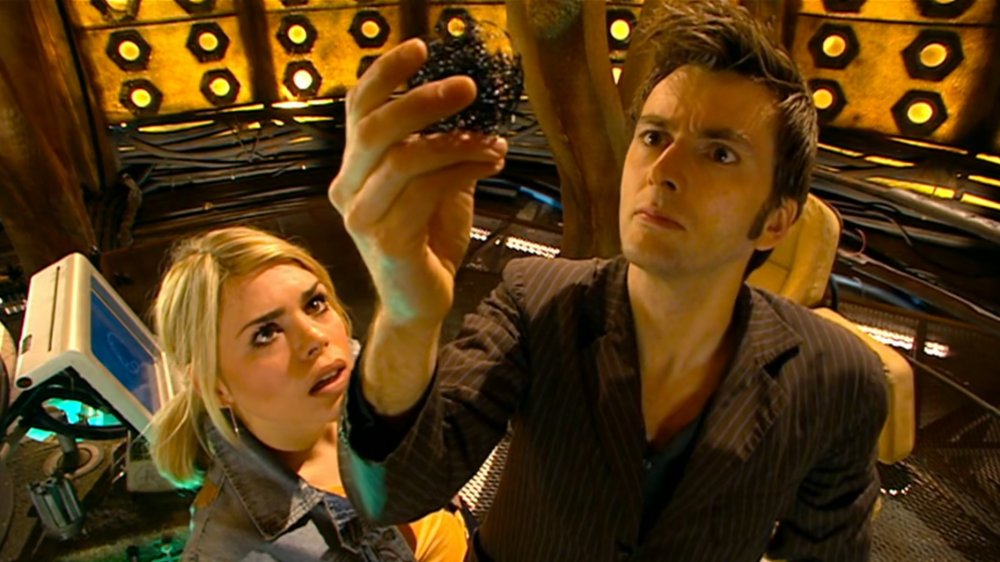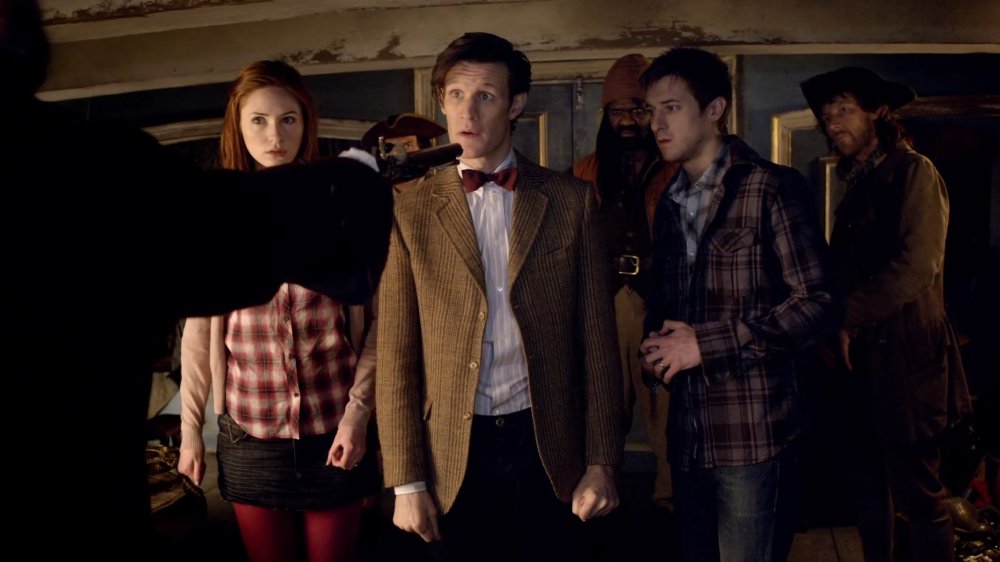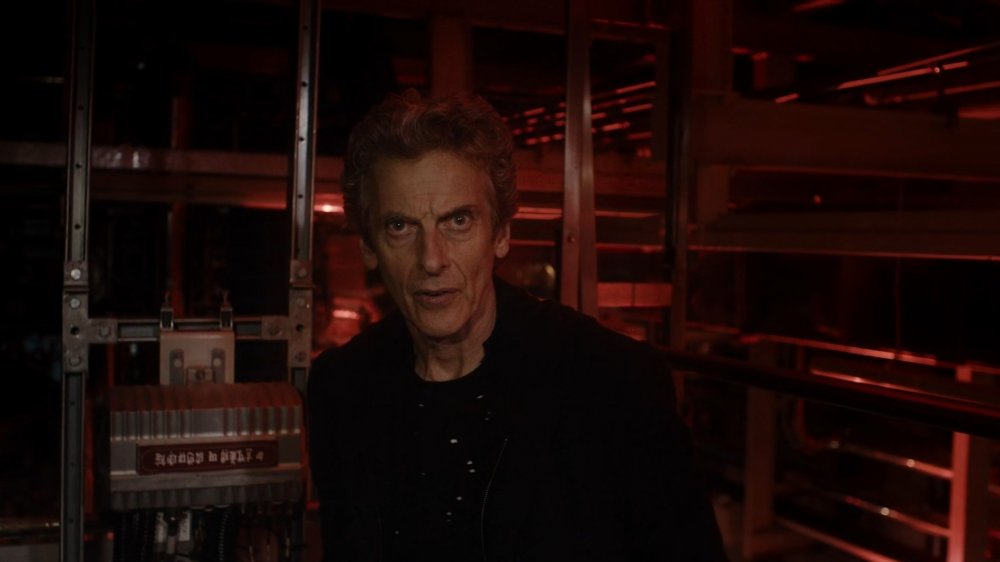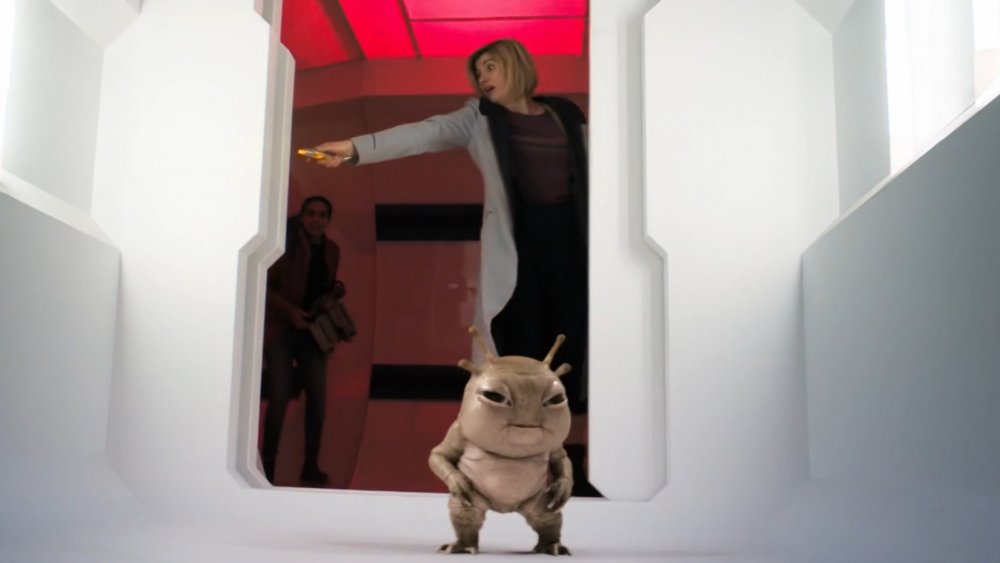What Doctor Who Fans Think Are The Show's Weakest Episodes
If Doctor Who fans love one thing more than Doctor Who, it's hating Doctor Who. Every season, fans take to the internet to explain in great detail why they dislike their favorite show, and how, without question, the newest episode has irrevocably damaged the otherwise flawless legacy of this once-proud program.
As treasonous as it might be to say such a thing, it's all a little goofy. Doctor Who has been around since 1963. Its first season alone consisted of 48 episodes. There have been over 800 more since then. Even the people who bring that "vinyl just sounds so much warmer" energy and claim that the old seasons are the best, when pushed, would rather chew furniture tacks than binge all 172 entries in the Tom Baker era. But somehow, even with clips of John Pertwee being strangled by a sentient telephone cord readily available to view, some Whovians will still tell you that "Love and Monsters" was the worst thing that's happened to the British Isles since Bostonians decided they wanted less expensive chamomile.
Still, a whiney broken clock is right twice a day, and the TARDIS crew has put out some stinkers since the show's revamp in 2005. Let's take a gander at the Time Lord's least-beloved adventures through space and time, broken down by regeneration. Beware of potential spoilers ahead — or possibly behind. "Wibbly wobbly" and all of that.
9th Doctor - Aliens of London/World War Three
When the Doctor first returned to TV screens in 2005, he had a lot of weight on his shoulders. The show had been off the air for the better part of two decades, with just a pit stop on Fox in 1996 to turn Eric Roberts into a CGI snake monster. Expectations were high, but somehow, showrunner Russell T. Davies and incoming star Christopher Eccleston managed to exceed fan expectations, bringing the good Doctor into the 21st century and adding something new that the Time Lord, for all of his travels through the cosmos, had never witnessed before: A budget.
This isn't to say that there weren't some growing pains. Juggling camp and quality can be a struggle, and there were viewers who felt that a few episodes failed to find the right balance.
Which brings us to the series 1 two-parter "Aliens of London" and "World War Three," in which audiences were introduced to the Slitheen, a family of nefarious Raxacoricofallapatorians, which is pronounced the way it's spelled. They weren't perfect. They were, for the majority of their time on screen, a trio of fat jokes who farted a lot. As first season maneuvers go, it was a big swing.
On the bright side, the story wound up setting the stage for "Boom Town" later the same year, a well considered, subtle episode about the possibility of redemption, the nature of forgiveness, and flying surfboards.
Tenth Doctor - Fear Her
David Tennant brought a lot to Doctor Who, consistently elevating the show's writing even on its bad days — not a lot of actors could speak the Judoon language and pass it off as gravitas. There's a reason that he's still constantly ranked as the fans' favorite incarnation of the character. He managed to make people afraid to blink, and he did it wearing sand shoes.
Of course, the problem with elevating writing is that it means the writing needs to be elevated, and no episode of the Tenth Doctor's tenure needed platform heels more than "Fear Her." Few entries in the series have felt more paint-by-numbers and joyless. For all of the Doctor's snarling sonic screwdriving, there's just not much to like about the story.
In the episode's defense, it was written specifically for kids, with Davies requesting a lighter narrative to help balance out the bleak two-part season finale that would follow. Unfortunately, even in a show about a time traveling alien and his bestest friends, the story of a little girl using color crayons and imagination to ruin the Olympics feels pretty, you know, stupid. The lonely alien entity is called an "Isolus." You could cut the subtext with child-safe scissors. It's difficult to imagine, but in some writers' room circa 2005, someone said, "Do you think audiences want to hear the kookaburra song 80 times in a row," and somehow, someone else must have said, "sure."
Eleventh Doctor - The Curse of the Black Spot
It seems unavoidable that any time a kid shows up on Doctor Who, things are going to get saccharine. Sometimes they'll drone on about kookaburras, sometimes they'll be reunited with their mummies. Sometimes the Cybermen will be defeated by the power of love. On very special occasions, space whales will sing out, almost harmonizing with the astonishing realization that maybe, just maybe, the Doctor was the real space whale all along.
And then, there's the pirate kid. the one from the Eleventh Doctor's "The Curse of the Black Spot." The episode had all the markings of a classic: The Doctor and company wind up on a haunted pirate ship, living up to the old showbiz axiom, "If it's good enough for Scooby-Doo, it's good enough for everyone else."
The big problem with "The Curse of the Black Spot" isn't that it's a little uninspired, or even the way that it shoehorned a lesson about fatherly affection into a story about space ghosts on the high seas. No, the main trouble is that it took place immediately after "Day of the Moon" and "The Impossible Astronaut," the cinematic sixth series openers. Viewers were still bursting with questions. Who was in the space suit? What was going on with the Silence? Was the Doctor really doomed to die on the shore of Lake Silencio? Instead of answers, they got 45 minutes of, "Ah beans, Rory's gone and stepped in it this time."
Twelfth Doctor - Sleep No More
Peter Capaldi's run on Doctor Who gets short shrift for some reason. The acclaimed Scottish actor brought a lot to the role, and showrunner Steven Moffat had certainly hit his stride by the time that the Twelfth Doctor debuted. Sure, it took a few episodes for this incarnation to find his footing. "Robot of Sherwood" feels like it takes place on a completely different show than some of Twelve's darker offerings like "Hell Bent" and "Death in Heaven." All in all, though, some of the Doctor's greatest moments came out of Capaldi's all-too-brief three-series run.
The problem with doing so much right, though, is that it throws the stuff you get wrong into sharper contrast. "Sleep No More" isn't a bad episode per se — it's just a fat nothing burger. Eye gunk monsters aren't that far removed from "statues that move when you aren't looking" and "a scarecrow army" in terms of monster-of-the-week ridiculousness. A space station full of sleep pods is a prime locale for Doctor Who's brand of sci-fi oddities. The general consensus on "Sleep No More" is, pretty simply, that it doesn't serve a purpose or offer anything memorable.
Thirteenth Doctor - The Tsuranga Conundrum
It's been generally accepted that when a new Doctor appears, you have to give them a warm-up lap. Early episodes in a fresh Time Lord's tenure can feel like breaking in a new pair of shoes: A little uncomfortable, sure, but give it a few weeks and you won't even remember the experience.
Jodie Whittaker's Doctor had a steep hill to climb in terms of getting fans on board. She was the first female Doctor, coming onto the scene with a fresh showrunner and an apparent aesthetic obsession with crystals that would put a mid-'90s Shirley MacLaine to shame. Even without the Greek chorus of fan backlash that accompanied her arrival, "The Tsuranga Conundrum" was never going to make it onto a "Best Of" Blu-ray. Putting aside the Olympic-level amounts of exposition, it has the unfortunate distinction of being, in a lot of ways, a retread — stuck in an area full of deadly, energy-consuming monsters with no way out? Sounds a lot like the Eleventh Doctor's "Flesh and Stone." But hey, 37 series is a lot of television. Repeats are going to happen.
To date, "The Tsuranga Conundrum" remains one of the revived Doctor Who's lowest-rated episodes on iMDB, commanding an unfortunate 4.9 stars out of 10 and coming in just behind "Arachnids in the U.K.," which received a gentleman's 5. Fan reactions to the last few seasons have been decidedly mixed, but hopes are high that everything will come together for Thirteen, with Whittaker having recently signed on for another year on the TARDIS.
